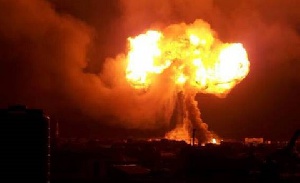It was around 7pm that gloomy Saturday night when I turned on my WhatsApp chat to catch up with the world, only to be greeted with over 200 flashing messages.
I wondered what that meant because I had cleared all the messages around 3pm that day. And normally, Saturdays tend not to be too busy with WhatsApp messaging.
In my curiosity, I started opening group chats for that is where one normally gets the gossips in town. Then I flipped through individual chats and almost all the messages coming through were the same.
To my dismay, vivid and gloomy pictures of what looked like the rapture itself were popping up. All fingers were pointing to an explosion at Atomic Junction, a suburb of Accra. On one platform, someone living in Aburi could see the smoke even from that distance. Friends and family members living outside the country had all heard about an explosion in Accra and were calling to find out.
I turned on the television well and behold what I was seeing on WhatsApp was confirmed. A Gas explosion? My immediate reaction was a soliloquy. Those deadly accidents were becoming one too many. When were we going to see an end to explosions and fire outbreaks at gas or fuel stations and the utter devastations they visit on us?
Deadly explosions
Over the last few days as the results of the explosion gained currency, I have learnt to my charging that in a space of three years, between 2014 and 2017, our country has experienced eight deadly gas explosions. This is aside of the notorious fire and flooding incident that occurred at the Kwame Nkrumah Circle in Accra on June 3, 2015, where nearly 130 souls were lost needlessly.
A crippling unforgettable happening which we all swore never to see happen again to us as the nation. We swore, or better still, our leaders promised us that they would put things in order so that such catastrophes would not happen to us again.
No lessons seem to have been learnt, unfortunately.
We do not seem to take safety serious. Yet when something happens, we quickly blame others. We always forget that our attitudes play major roles in the kind of disasters that we encounter on day to day basis. It is rightly said that accidents don’t just happen. They are caused.
We know from all the accounts out there in the public domain that the driver of the gas tanker who was discharging the liquefied petroleum gas at the station where the explosion occurred, sounded those who were in the area to move away because the gas was leaking badly.
This meant that the driver knew what he was doing was against one of the rules of their game and which admonished them not to offload when they sense gas was leaking.
The gas tanker drivers know that they are not to discharge gas at night. They know that when they are discharging, they should ensure that the area was free from any human activity. This driver breached some of the rules, thus, acts of indiscipline were clearly exhibited here.
Another case of gross indiscipline is seen here on the part of the persons around. When the driver warned people to vacate the place because of the leakage, what did we see? Sellers, taxi and other commercial drivers continued to look on, going about their duties. Allegedly, there was the first explosion yet that was not enough warning for some people to move away.
They continued to hang around while many others ran away to as faraway safety as possible. The result is the fatalities, level of injuries and destruction of properties we saw. So, you ask yourself, for how long would we continue to take things for granted?
Safety practices
I once worked for a corporate institution where every employee from the top to the factory floor, was made aware of the essence of safety at all times. We were taught in our everyday work life not to take safety for granted whether in our offices or walking around the factory.
Safety meetings were made compulsory on Fridays and the time was even fixed - 12 noon. Everyone, no matter what you were doing at the time, was expected to attend their departmental safety meetings, a common agenda for which would have been circulated at least 24 hours earlier and a Chairperson for the departmental safety meeting nominated.
Attendance was recorded and minutes of the discussions were taken and forwarded to the Company’s Safety Manager.
Yes, there was a whole Health and Safety Manager who was responsible for coordinating Friday noon safety meetings and sending warnings to departments that were not living up to expectation. Quarterly prizes were given to those departments which exhibited consistency in holding meetings. Every department or office had a Safety Steward who ensured that the work environment was always safe.
A lot was learnt on safe practices not only for the workplace but also for the home and being on the road either as a driver or a pedestrian. Those safety values have lived with me till today.
Lawlessness
Unfortunately, within our society, lawlessness has become part of our everyday life to the extent that we even flout safety regulations and warnings with impunity. At fuel and LPG stations, despite the clear signages that people should not use mobile phones, we see attendants and sometimes customers busy on their mobile phones. People still load their petrol tanks with their vehicle engines running.
As a people, we have thrown safety away to the dogs and live as if we are insulated from accidents.
The loss of lives and properties on regrettable occasions such as we experienced last Saturday at the Atomic Junction is heartbreaking. Lawlessness played a part and I would not be surprised to see bubbly life returning sooner as if nothing had happened. In a matter of time, we will see business as usual when the dead are buried and pains and aches have subsided.
Gas would leak; mobile phones would continue to be used at filling stations, lawlessness would reign until another explosion and fire erupt in another part of the country. That is when we would once again turn the heat on ourselves. Do we ever learn?
Opinions of Sunday, 15 October 2017
Columnist: Vicky Wireko-Andoh
Explosion that shook a nation – never again revisited
Entertainment

What Bullgod said about going to prison for the NDC
Opinions












